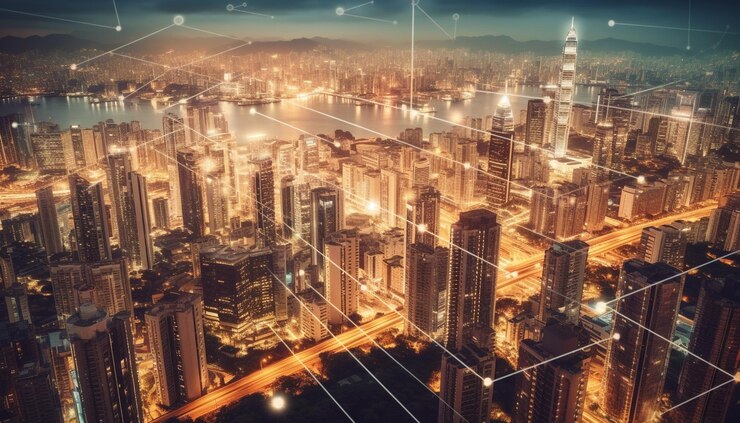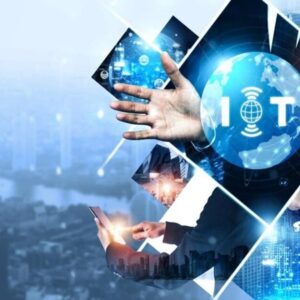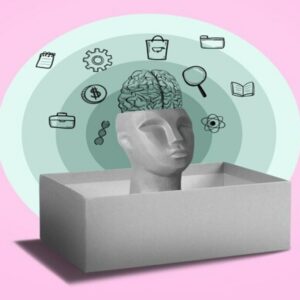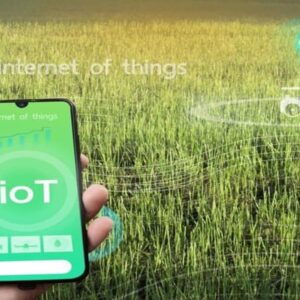Smart Cities
If you’ve ever wondered what it would be like to live in a city where technology is not just a tool but a constant ally in our daily lives, then you are about to dive into the fascinating world of Smart Cities. Today, we will explore how the Internet of Things (IoT) is shaping the urban future, transforming ordinary cities into hubs of innovation and efficiency.
Total Connectivity: The Heart of Smart Cities
Imagine a place where traffic lights adjust automatically to the flow of traffic, where solid waste is collected the moment bins are full, and where street lights come on as you approach, saving energy when no one is around. This is not science fiction; it’s the reality of Smart Cities, where the IoT weaves an invisible web of information to optimize urban operations.
Total connectivity is the beating heart of these cities of the future. Smart sensors are present in every corner, collecting real-time data on traffic, air quality, energy consumption, and more. This information is processed by advanced algorithms, enabling quick and efficient decision-making to improve the quality of life for citizens.
Energy Efficiency and Environmental Sustainability
Sustainability is a priority in Smart Cities. The IoT plays a crucial role in the efficient management of natural resources. Intelligent lighting systems, for example, automatically adjust light intensity based on the presence of people, reducing energy waste. Furthermore, real-time environmental data collection enables the implementation of proactive strategies to combat pollution and improve air quality.
Urban Mobility Transformed by IoT
Urban mobility is another area where the IoT leaves its indelible mark. Imagine receiving real-time information about parking space availability, precise bus arrival and departure times, and even the exact location of bike-sharing points. This is the promise of smart urban mobility, where the IoT creates a fluid and efficient transportation ecosystem.
Moreover, data collection on traffic patterns enables the development of more efficient routes, reducing congestion and decreasing time spent in traffic. In Smart Cities, mobility is not just about getting around but doing so intelligently and sustainably.

Challenges and Ethical Considerations
Despite all the benefits, the massive implementation of IoT in urban environments raises important questions about privacy and security. How can we ensure that collected data is used ethically? What is the balance between convenience and the protection of individual privacy? These are dilemmas that Smart Cities face and require careful planning and regulation.
As we embark on this journey towards Smart Cities, it is crucial to address the challenges and ethical considerations that come hand in hand with the integration of IoT. Privacy concerns are at the forefront, with citizens rightfully questioning how their data is being collected, processed, and utilized. Striking the right balance between leveraging technology for urban improvement and safeguarding individual privacy is paramount.
Furthermore, the vulnerability of interconnected systems to cyber threats is a pressing issue. With a multitude of devices and sensors communicating seamlessly, the risk of cyber attacks increases. It is imperative for Smart Cities to invest in robust cybersecurity measures to protect sensitive data and ensure the uninterrupted functioning of critical urban infrastructure.
Community Engagement: A Key Element
The success of Smart Cities isn’t solely dependent on technological advancements. Community engagement plays a pivotal role in ensuring that the needs and concerns of the citizens are taken into account. The implementation of IoT should be a collaborative effort involving local communities, government bodies, and technology experts. By fostering open communication and involving residents in decision-making processes, Smart Cities can address specific urban challenges more effectively.
The Road Ahead: Future Possibilities
As we look ahead, the potential of IoT in shaping Smart Cities is limitless. Imagine healthcare systems that utilize real-time data to predict and prevent the spread of diseases, or waste management systems that optimize collection routes based on fill levels of bins. Smart Cities have the potential to become hubs of innovation, creating an ecosystem where technology enhances every aspect of urban living.
Moreover, the lessons learned from early adopters of Smart City initiatives can serve as a blueprint for others. Collaboration between cities worldwide can accelerate the development and implementation of best practices, ensuring a more sustainable and interconnected future.

In Conclusion: A Smarter Tomorrow
In conclusion, the advent of IoT in shaping Smart Cities represents a paradigm shift in the way we perceive and interact with urban environments. It’s not just about the integration of technology; it’s about creating cities that are responsive, sustainable, and, most importantly, centered around the well-being of their citizens.
The journey towards Smart Cities is an ongoing process, with challenges to overcome and lessons to learn. By addressing ethical considerations, fostering community engagement, and embracing innovation, we pave the way for a smarter, more connected tomorrow. The Internet of Things is not just a technological evolution; it’s a catalyst for a transformation that has the potential to redefine the future of urban living. Welcome to the era of Smart Cities, where innovation meets the pulse of the cityscape.
Did you like this topic? See more content about: IoT (Internet of Things)
SOURCE: medium





